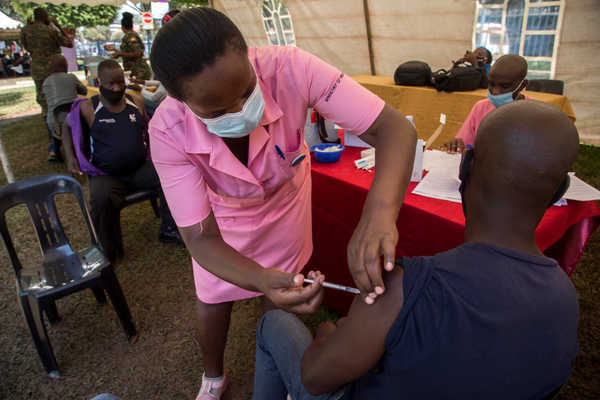Taking Covid jab should not be forced, experts say

A health worker attached to the Uganda People’s Defense Forces (UPDF) administers Covid-19 vaccine
What you need to know:
- On the question whether vaccination does completely solve the problem of the pandemic, Dr Carol Atugonza, a BioMedical Scientist, said, “Science community does not have 100 per cent of the answers to say they have completely explored what either Covid-19 or the vaccine does (to the body). Studies and processes are still under trial with priority being given to find solutions towards eliminating the virus.”
- President Museveni said the government would have received about 23 million doses of Covid-19 vaccines by the end of December 2021, enough for more than 12 million Ugandans.
A section of experts have said people should not be forced to vaccinate against Covid-19.
The experts in respective professional fields gave their insights during the 7th virtual Town Hall meeting on Monday in Kampala, where the panelists debunked myths and interrogated the science and place of human rights and freedoms post the Covid-19 pandemic.
Mr Eron Kiiza, a human rights activist said as much as vaccines play a crucial role in protecting the body against Covid-19, there is no legal basis for forcing people to take them.
“Taking vaccines should be a matter of choice. People have a right to live a dignified life and this is injured when you force people to take some kind of medication,” Mr Kiiza said.
He added: “The mandate of the government is to instead encourage people to take up these vaccines but to really push them down their throats is an abuse of power and discretion and militates against personal liberty and autonomy.”
For Mr Jeffrey Tucker, the founder of Brownstone Institute, he said the Covid-19 situation in the world was what motivated him to author the book, Liberty or Lockdown, to highlight errors in the vaccination exercise.
“The sad thing is that you don’t see many people admitting these errors, instead, they say… Hereis a vaccine, now, you have to get it,” Mr Tucker said.
He added: “If you want the vaccine, you get it, but it should not be required because some people do not trust it. The vaccine has not been through normal trials, not been approved effectively and now data is showing that it is associated with (some) adverse effects.”
On the question whether vaccination does completely solve the problem of the pandemic, Dr Carol Atugonza, a BioMedical Scientist, said, “Science community does not have 100 per cent of the answers to say they have completely explored what either Covid-19 or the vaccine does (to the body). Studies and processes are still under trial with priority being given to find solutions towards eliminating the virus.”
Meanwhile, Mr Simon Ssenyonga, a lawyer, said universities that were refusing unvaccinated students from accessing respective learning institutions were denying them their right to a freedom of education.
As universities reopened for learning in November, learning institutions like Kyambogo notified both students and staff that only those with Covid-19 vaccination cards would be allowed to access the premises. The directive has since been relaxed following government intervention urging Kyambogo and other universities to set up vaccination centres within the learning institutions so that students who are not vaccinated can easily get the jab.
Their insights come at a time President Museveni mentioned in October that the economy will fully reopen in January 2022 and for this reason, urged Ugandans to embrace vaccination while they still can.
President Museveni said the government would have received about 23 million doses of Covid-19 vaccines by the end of December 2021, enough for more than 12 million Ugandans.




